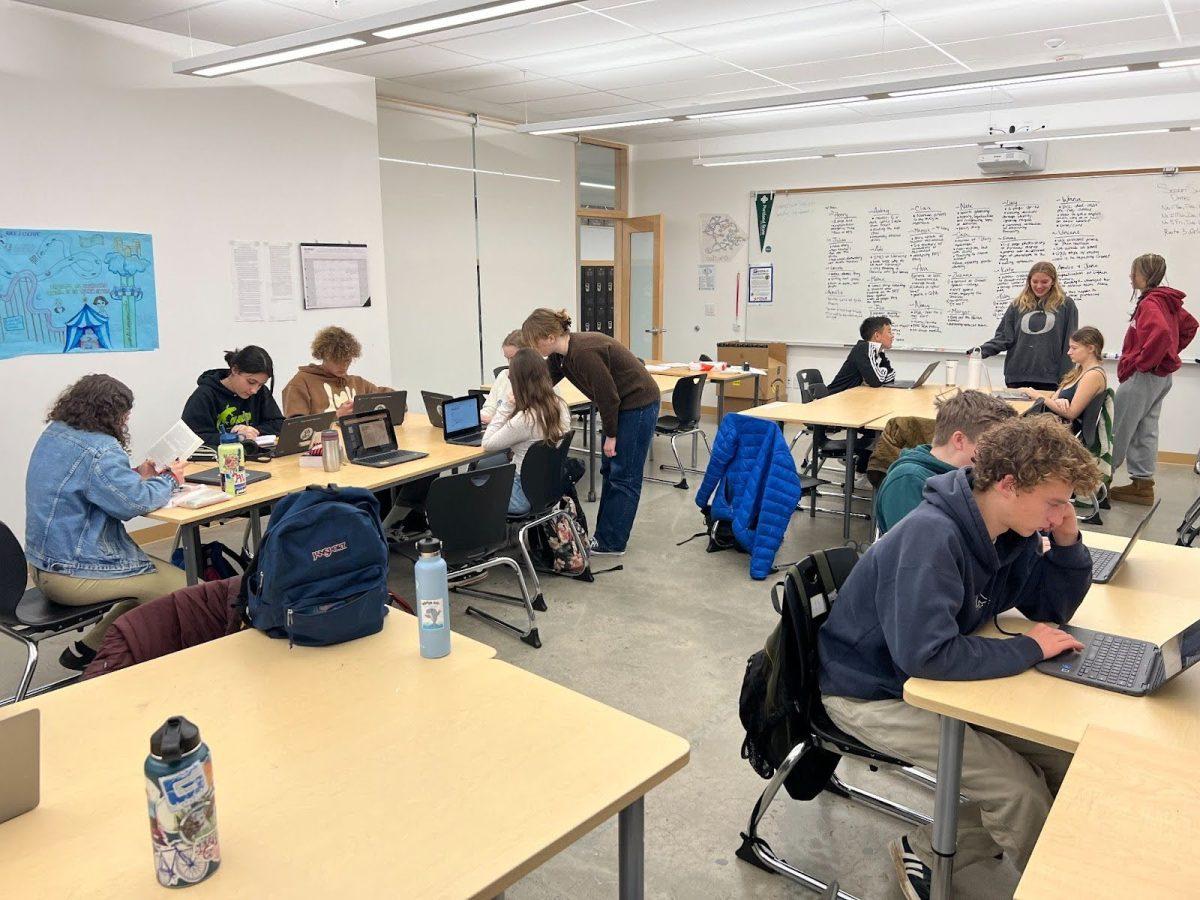
It’s a Friday in mid April. Téa Johnson sits in the Newmark Theater, mentally tallying her scores and comparing them to those of the other poets. She waits eagerly for the winners of Verselandia 2016 to be announced.
She recounts the previous rounds, doing the math in her head. By her calculations, she should end up in third or fourth place. Her name goes unread and she thinks: “It’s a shame I didn’t place this year.”
“And the winner of Verselandia 2016 is… Téa Johnson!” the judge says.
A jolt of excitement shoots through her, and she walks on stage in complete disbelief. “I almost cried,” Johnson says.
Now a Grant senior, she took the top spot in the biggest high school slam poetry competition in Portland. Johnson has never been one to shy away from the limelight – from a young age, she’s always been interested in singing and acting. And it never matters whether it’s in front of her parents or a huge audience.
“She’s good at piecing words together in a way that’s powerful.” – Ellory Schrepel
In the past, Johnson’s slam poems have been largely comedic, covering topics like boys and serial killers. But lately, her performances are more than just entertainment – they’re her take on social justice issues facing society today. As a queer woman of color who comes from a less than normal family situation, Johnson knows what struggle and inequality feel like, and now she’s channeling that tension and turning it into her own thought-provoking art.
“I spend so much time on Facebook complaining and being like, ‘This isn’t fair. Sexism isn’t fair. Racism isn’t fair.’ But I want to speak out on a broader platform and I want to use my artistic voice to speak out,” Johnson says.
Johnson was born on Nov. 3, 1998 in Mount Pleasant, Mich. Born an only child to Alicia Tate and Joseph Johnson, she remembers always wanting to be at the center of her parents’ attention. Johnson’s family structure has always been unique – her parents were never married, and they split up when Johnson was a year old. “I didn’t even realize until like kindergarten that most people’s parents were together,” she says.
Johnson had a deep interest in acting, being onstage and performing in plays as a youngster. “She was so vocal and just seemed so comfortable being in front of people on stage,” Tate says.
Johnson was 4 when her mother was diagnosed with multiple sclerosis, an illness that causes many symptoms including fatigue and muscle numbness. In severe cases, it leads to paralysis and blindness.
Tate made regular trips to the doctor, thinking she only had chronic fatigue syndrome years before being diagnosed.
Then, when she was 30, she began going blind in her right eye. Shortly after, she began to lose feeling on the right side of her body.
When she was fully diagnosed, Tate remembers having mixed feelings. “It was almost kind of a relief because it had explained why I had been having all of these other health issues,” she says.
In 2005, Johnson’s family moved to Portland for a change of scenery and more racial diversity after living near Pullman, Wash., and Moscow, Idaho. “You know it’s bad when you move to Portland, Oregon for racial diversity,” Joseph Johnson says.
While she was in grade school at Llewellyn Elementary, Johnson fed her creativity by filling notebooks with fan-fiction stories and attending theater camps.
Her outspoken personality on-stage was the same off-stage. She got along well with other kids for the most part, but she never hesitated to call out things she didn’t approve of.
When Johnson was in third grade, a group of fifth graders began picking on one of her friends and calling him a “nerd.” Johnson wouldn’t stand for it. “What’s wrong with you? Leave him alone!” she yelled at the fifth graders. “They left him alone after that,” she says proudly.
“‘This isn’t fair. Sexism isn’t fair. Racism isn’t fair.'” – Téa Johnson
Johnson remembers not understanding how insensitive and ignorant the other children were to those who were different, using “gay” as a term for things they didn’t like.
“I was like, ‘That’s not OK to say. You can’t say that,’” Johnson says.
In fifth grade, her life became more complicated. During the winter of 2009, Joseph Johnson was laid off from his construction job.
With the recession at an all-time high, he struggled to find another job. “There was just nothing out there,” he says.
Not long after, Johnson and her father found themselves packing their clothes after being evicted from their apartment when they fell behind in rent.
Eventually, he landed a job building and refinishing vintage homes, and he purchased a sailboat to live on. He says living on the boat was what needed to be done so he could stay in Portland and be involved in his daughter’s life. “It’s an interesting lifestyle. It’s not for everyone,” he says.
Johnson stayed full-time with her mother, but her dad remained close to the family. Johnson helped her mom with her illness, whether it was making dinner or bringing her mom beverages when she wasn’t feeling well.
It was at da Vinci Arts Middle School that Johnson was first introduced to slam poetry. Her English teacher, Shannon Wasson, led a slam team that met once a week. “When I was younger, I like, wrote poetry all the time and I was like, ‘This is fun, but I feel limited,’” Johnson says.
At the time, Johnson realized that she identified as queer. To Johnson, this means she experiences attraction to all people, regardless of their sex or gender identity. “I like everyone. I like women. I like men. I like people who don’t identify as either,” Johnson says. “I’ve never seen someone’s gender as a reason to have a crush on them or not have a crush on them.”
She says that coming out to her parents was never a problem because her family was so supportive and accepting.
In middle school, Johnson met Ellory Schrepel. Johnson’s curious hairstyles and bold personality drew Schrepel to her, and they’ve been close friends ever since. “Her slam poetry is a way she can express herself and say what she’s thinking,” Schrepel says. “She’s good at piecing words together in a way that’s powerful.”

She also enjoyed getting to understand different perspectives when listening to the slam poetry of others. “There’s all these injustices in the world people don’t understand unless they’re a part of a certain community,” she says.
Freshman year, she wrote one of her more serious poems about her father and his struggles through life in the recent years, and how he had overcome them by being resourceful. “I always thought he was someone who was really hard working,” Johnson says. “As I’ve gotten older and I’ve realized what my dad has gone through and how, like, strong he’s stayed…that’s made me understand and respect my dad a lot.”
Johnson remembers her dad crying after hearing the poem. “Everyone thought it was really sweet,” she says.
Johnson competed in the Grant Slam again as a sophomore, coming in second in the competition and qualifying for the citywide Verselandia for the first time.
As a sophomore, both of Johnson’s poems for the Grant Slam were comedic, including a letter to every boy she has ever had a crush on, which the audience loved. “People went crazy for it,” she recalls.
Later that year in the spring of 2015, Johnson joined the Bridging Voices Gay Straight Alliance Youth Chorus, a group designed to empower people of any gender or sexuality through music.
After joining the choir, Johnson began hearing horrible stories of discrimination that other people in the group had faced because of their sexuality. “A lot of kids have to hide who they are from their parents…that’s so sad to me,” Johnson says. “I didn’t realize how horribly that can affect people. I don’t think it’s fair to treat people differently or like make these judgments on people based on who they love or what their gender is.”
Junior year, Johnson performed in the school play, “As You Like It,” playing Corin. “My character was kind of like this hippie-mom character,” Johnson says. She also competed in the Grant Slam for the third time that year.

Johnson placed first in the Grant Slam, sending her to Verselandia for the second year in a row. She remembers reciting her poems countless times before getting on stage. She feared she would forget them, even though they were the same poems she’d performed for the Grant Slam less than two weeks earlier. “It’s really nerve-wracking,” she says.
However, once she stepped on stage, her nerves disappeared. “Once I get on stage, I’m fine…It’s just like talking to a friend,” Johnson says.
Although Johnson thought she would do well in Verselandia, she had no idea she would win. “I didn’t go into the competition expecting to win,” she says.
Her parents were so surprised and excited, Alicia Tate almost punched her mother in the face by accident. “My heart went from dropping and did a U-turn,” Joseph Johnson remembers. “I may have even gotten a little misty- eyed.”
After winning Verselandia, Johnson was asked to join a Portland slam group called Spit/Write to help mentor students new to slam poetry. She also attended a slam poem festival in Washington, D.C. in July.
“I just think it was so amazing to see so many people from so many different backgrounds,” says Johnson. “I have never been in a space with so many people of color.”
As a senior, Johnson plans to continue to stay politically active through her poetry and hopes to write more serious slam poems during an intense and divided time in the United States. She sees it as her responsibility. “All of these other people have had this courage to speak up,” says Johnson. “And I feel that I, too, need to speak up.” ◊









































